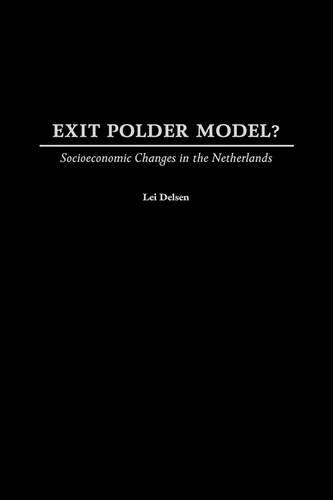
Exit Polder Model: Socioeconomic Changes in the Netherlands
(Hardback)
Publishing Details
Exit Polder Model: Socioeconomic Changes in the Netherlands
By (Author) Lei Delsen
Bloomsbury Publishing PLC
Praeger Publishers Inc
30th December 2002
United States
Classifications
Tertiary Education
Non Fiction
330.9492
Physical Properties
Hardback
240
Description
To what does the Netherlands owe their recent economic success Will the polder model become the victim of its own success or will the threat come mainly from outside In the Netherlands, polder are small communities hemmed in by dykes built to resist quickly rising tides, and hence imply communal effort to mediate harmful outside forces. Translated into economic terms, the polder model entailed tripartite cooperation between business, government, and labor to protect the nation's economic and social well being. Delsen evaluates recent changes in the Dutch economy brought on by globalization and American dominance and concludes that the polder model is reaching its end. Delsen argues that the market forces introduced by the purple governments imply a far-reaching adaptation of the unique Dutch economic order. The primacy of the market has resulted in a more flexible labor market, decentralization of the wage formation, modernization of the social security system, more competition on the goods markets, and liberalization and competition in the financial markets. More market forces within Dutch socioeconomic relations imply also that the aims of trade and industry have changed, and have become oriented toward short-term results and away from actions aimed at long-term continuity and consensus.
Reviews
.,."one of the most important books written on the analysis of socio-economic policy-making in the Netherlands."-Dr. Hans Keman Editor-in-Chief, European Journal of Political Research and Chair, Political Science Free University of Amsterdam
"Delsen's book comes to the aid of all of us who call for a measured and cool-headed assessment of the pros and cons of the Polder model. Delsen provides an unusually well-written and balanced portrait of what the model really is--and is not. This book ought to be required reading for all those fans (and foes) of the Dutch Miracle."-Gosta Esping-Andersen Professor of Political and Social Science University Pompeu Fabra Barcelona, Spain
"Delson provides a microeconomic analysis of the Polder Model, including its dark underside of rising inequality and social exclusion. While not everyone will agree with Delsen's prescriptions for addressing these problems, this stimulating book belongs on the reading list of researchers and policymakers everywhere who are trying to reconcile welfare and work and to provide every person with access to a basic income and a right to a job."-Eileen Appelbaum Rutgers University
[P]resents a very convincing and clear picture of the internal inconsistencies of the polder-model policies....[D]elsen has built an elegant and concise theoretical model.-Governance
"Presents a very convincing and clear picture of the internal inconsistencies of the polder-model policies....Delsen has built an elegant and concise theoretical model."-Governance
"[P]resents a very convincing and clear picture of the internal inconsistencies of the polder-model policies....[D]elsen has built an elegant and concise theoretical model."-Governance
Author Bio
LEI DELSON is Assistant Professor in the Department of Economics of the Nijmagen School of Management, University of Nijmagen, the Netherlands.
